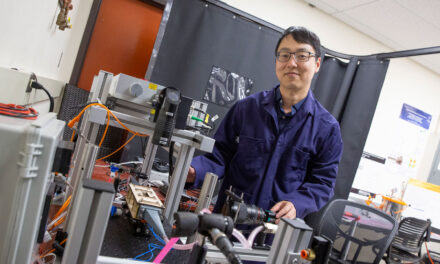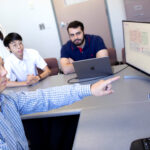
Two more checks on 33 Buckets’ list
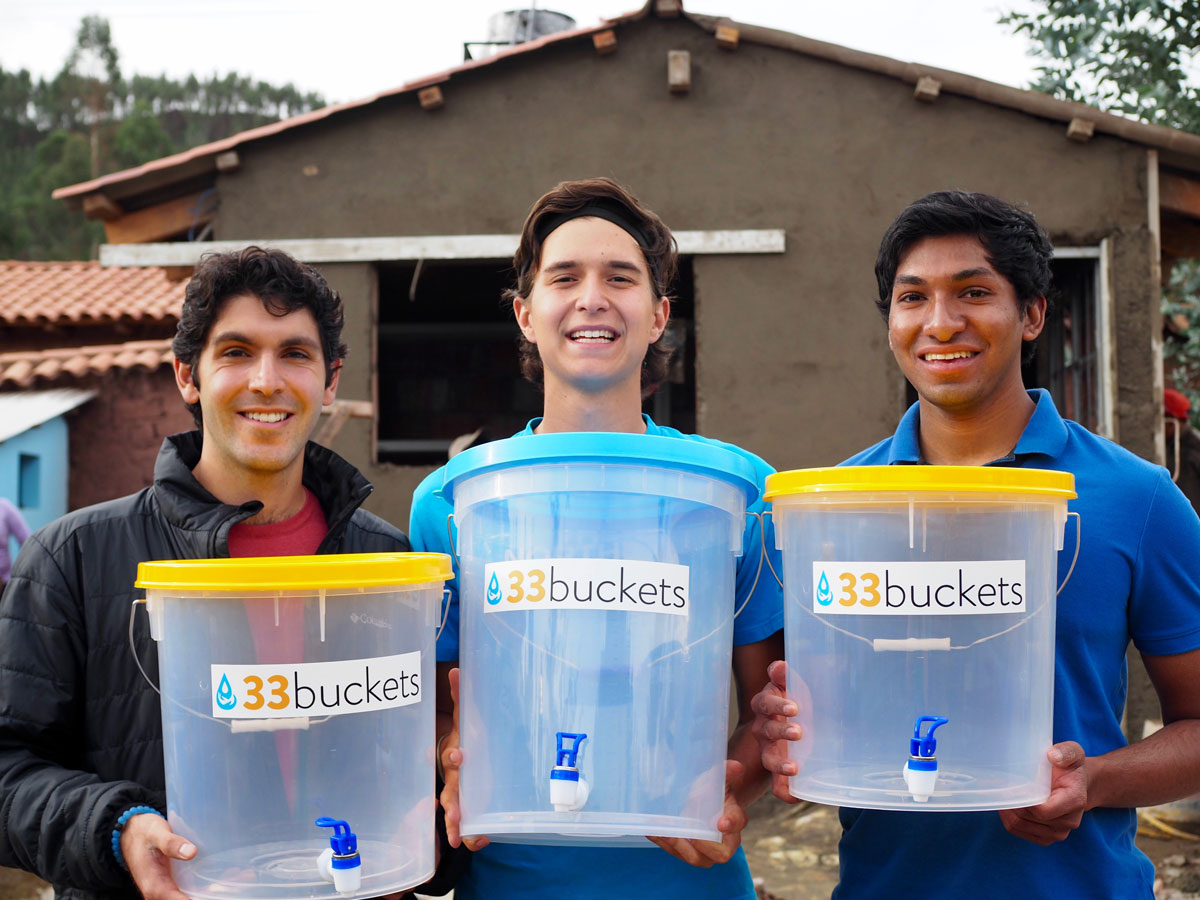
Rural Peru, Dominican Republic communities benefit from ASU startup’s water purification solutions
Every day, Altagracia used to walk a mile away from home to a cave to fetch water for her family of four children. When a pump and pipes were installed that delivered water to the Sabana Larga community outside the provincial capital of Monte Plata, Dominican Republic, she thought her treks to the cave were over. Unfortunately, droughts, water shortages and a lack of maintenance make it unreliable, and the original groundwater source is contaminated with a high concentration of bacteria and coliforms, including e.coli.
A year ago Altagracia never could have imagined her community would have access to clean water in her lifetime.
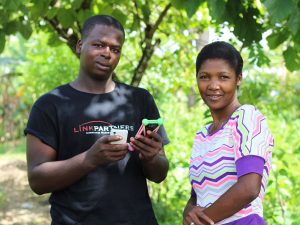
Anderson and Altagracia sell and distribute clean water to their community of Sabana Larga in the Dominican Republic. Photo courtesy of Vid Micevic
Now Altagracia and her new business partner Anderson not only have clean water for their own families, they provide the other nearly 1,000 people in their community access to stores of clean, affordable water.
More than 2,000 miles away near Cusco, Peru, 1,500 people in the Huillcapata community no longer have to depend on their contaminated water supply, with bacteria at levels that measure 2,000 times the acceptable World Health Organization-mandated limit. They now get clean water from their own local business, run by school principal Agripino.
These businesses of purifying and distributing water were made possible by water consultancy 33 Buckets, a team of three Arizona State University alumni from the Ira A. Fulton Schools of Engineering — CEO Mark Huerta, Technical Officer Paul Strong and Marketing/Design Officer Vid Micevic — as well as current undergraduate biomedical engineering student and the group’s Global Partnerships Officer Swaroon Sridhar. They help design and set up custom, modular filtration systems and work with the communities to create a sustainable distribution business and education program about clean water.
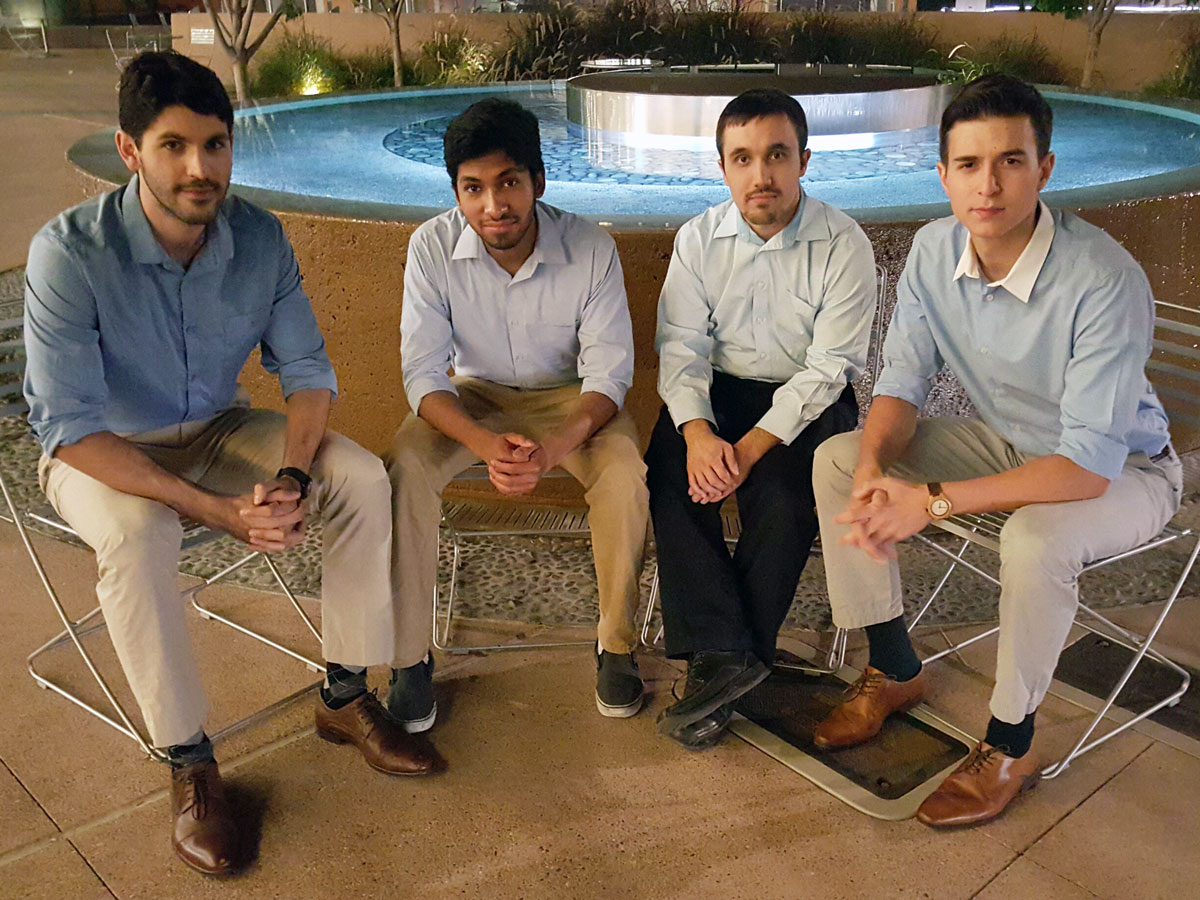
Mark Huerta, Swaroon Sridhar, Paul Strong and Vid Micevic of 33 Buckets. Huerta graduated from ASU with a master’s in biomedical engineering, Strong has a master’s in mechanical engineering from ASU, and Micevic received his bachelor’s in sustainable engineering from ASU. Sridhar is currently studying biomedical engineering. Photo courtesy of Vid Micevic
Addressing a global crisis one community at a time
Around the world, 1.8 billion people lack access to clean water, and 8 million people die of water-related diseases every year. The World Economic Forum calls global water crises the biggest threat to the planet over the next decade.
Water sources can become contaminated in a number of ways. Some are contaminated with naturally occurring bacteria, heavy metals or sediments, or can become contaminated from sewage or pollutants like pesticides from agricultural runoff or toxic substances from mines.
WHO estimates that providing access to clean water and education on proper sanitation and hygiene can eliminate 56 percent of the global disease burden.
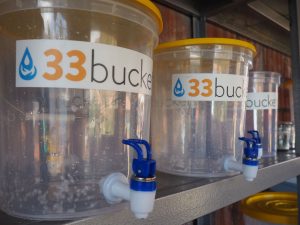
33 Buckets uses a system of containers and swappable filters to meet the unique filtration needs of each community. In Peru they used ultra filtration to filter bacteria from the local water source. Photo courtesy of Vid Micevic
To meet this need, 33 Buckets has developed a modular approach to water filtration where different filters and components can be swapped in and out depending on a community’s specific needs.
For places like the Dominican Republic and Peru where bacteria is the primary concern, ultra filtration — a membrane filter that traps bacteria and other particulates and lets water flow through its tiny pores — is the best solution.
“The nice thing about this system is it’s really good for rural areas because it’s gravity-fed — no electricity required,” Huerta says. “The maintenance is also really easy, only a few minutes a day, and it lasts for 7–10 years.”
Other contaminant filters include sediment filters, activated carbon and reverse osmosis. UV filters can be added if electricity is available.
“The design depends on what we find, what’s locally available and what can be maintained,” Strong says.
From student project to international water consultancy
33 Buckets began in the Fulton Schools’ Engineering Projects in Community Service program in fall 2010 as a project to design a filtration system for the Rahima Hoque Girls’ College in Bangladesh. The system used buckets and filters to address the region’s arsenic (atomic number 33) contaminated water — hence the team’s name.
However, when the team made an assessment trip over the summer of 2012 it found the school’s water was contaminated with high concentrations of sediment rather than arsenic and had to rework the design. Two and a half years later — rather than the planned six months — the project was completed.
Over the course of their work, the team also learned that providing clean water through technology wasn’t enough.
“We have the technology to solve the clean water problem in the world,” Sridhar says. “What hasn’t been addressed is an effective method of global distribution. So we changed our focus to distribution and components for filtration as well as education, which is just as important to solving the water issue.”
In the summer of 2015, the 33 Buckets team launched beyond EPICS as an independent unit and teamed up with non-profits Green Program and Schools for Sustainability to begin community-focused projects in Peru and the Dominican Republic.
Involving the community in finding a solution
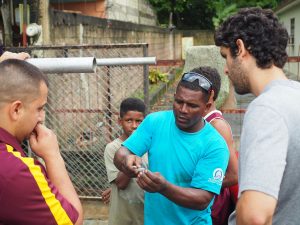
Huerta worked with local construction crews to build and maintain the water system in the Dominican Republic. Photo courtesy of Vid Micevic
Providing the filtration systems is only one part of the process. In paraphrasing an old proverb: give a community water and they drink for a day; teach a community to filter and distribute water, and they have a long-term, sustainable water system.
“So much of that first project was spent initially learning about the issue and then designing a model that would make the best impact long term for the community,” Strong says. “Now we have our model and philosophy of focusing not just on design, but also on full self-sustaining, community-run projects.”
After surveying each community’s water needs, local economy, and knowledge of water sanitation and hygiene, 33 Buckets involves local entrepreneurs and community leaders to get a distribution and support system in place.
“A big thing we look for is involvement in the project, especially at the early stage,” Huerta says. “If people are invested, they’re excited and realize the importance and want to dedicate their time.”
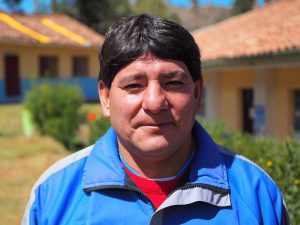
School Principal Agrepino serves as the Peruvian community’s entrepreneur and oversees business practices as a member of the water advisory board. Photo courtesy of Vid Micevic
Agripino, the school principal in Peru, was one such motivated person among many the 33 Buckets team encountered.
“He was so invested and confident in being able to make things work. He was a huge asset the entire time,” Huerta says. “In the Dominican Republic it was the same thing — incredible people with very interesting stories in how they came from so little and how much they value community development.”
Community leaders like Agripino and other trusted local figures, government officials, business owners, religious leaders, school leaders and others are brought together to form a water advisory board.
Each member of the board has a specific role to help keep the projects running smoothly. For example, the school representative is responsible for overseeing education and maintenance, the community leader makes sure fair practices are used, and the government performs extensive impact measurement and water quality tests.
Entrepreneurs run the day-to-day business of selling and distributing the filtered water to the community.
“The entrepreneur can be any number of people, but we try to make it someone who is interested in getting a job and has time to take on the necessary tasks,” Sridhar says. “Every community is different, so we try to identify someone who will be energetic and ready to take it on.”
The entrepreneur also is responsible for filling out financial spreadsheets of sales and allocation of money and salaries.
In the Dominican Republic, the money from the business goes to three places. A portion will pay Altagracia and Anderson’s salaries (both plan to save up to continue their educations). More will go into a bank account that is a reserve fund for repairs and supporting the school. And the rest can be spent to help other parts of the community.
In Peru, half the money will go to an operator Agripino hired, and the other half will go to the school.
A day of education and celebration
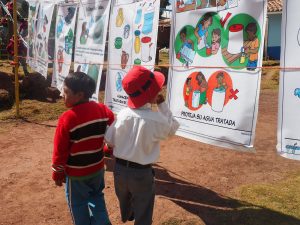
The Huillcapata community learned about water sanitation and hygiene during the launch day educational seminar in a poster session and discussion with community leaders. Photo courtesy of Vid Micevic
After the structure and support system are in place, 33 Buckets holds a day-long event dedicated to educating the community about clean water.
“Education in water sanitation and hygiene is important to make sure the water isn’t being contaminated post-filtration by storing it in dirty containers, for example,” Huerta says.
In Peru, they had a series of posters out on display and the teachers, school principal and government official taught the sanitation and hygiene lessons to the entire community.
“The community members were engaged with the lectures the whole time. Lecture topics led to discussions and children were shouting out answers to questions the teachers posed. It was a fantastic event,” Sridhar says. “After the lessons, the students lined up and wanted to try the water. When we asked how it tastes, every one of them shouted ‘rico!’ which in this case means delicious.”
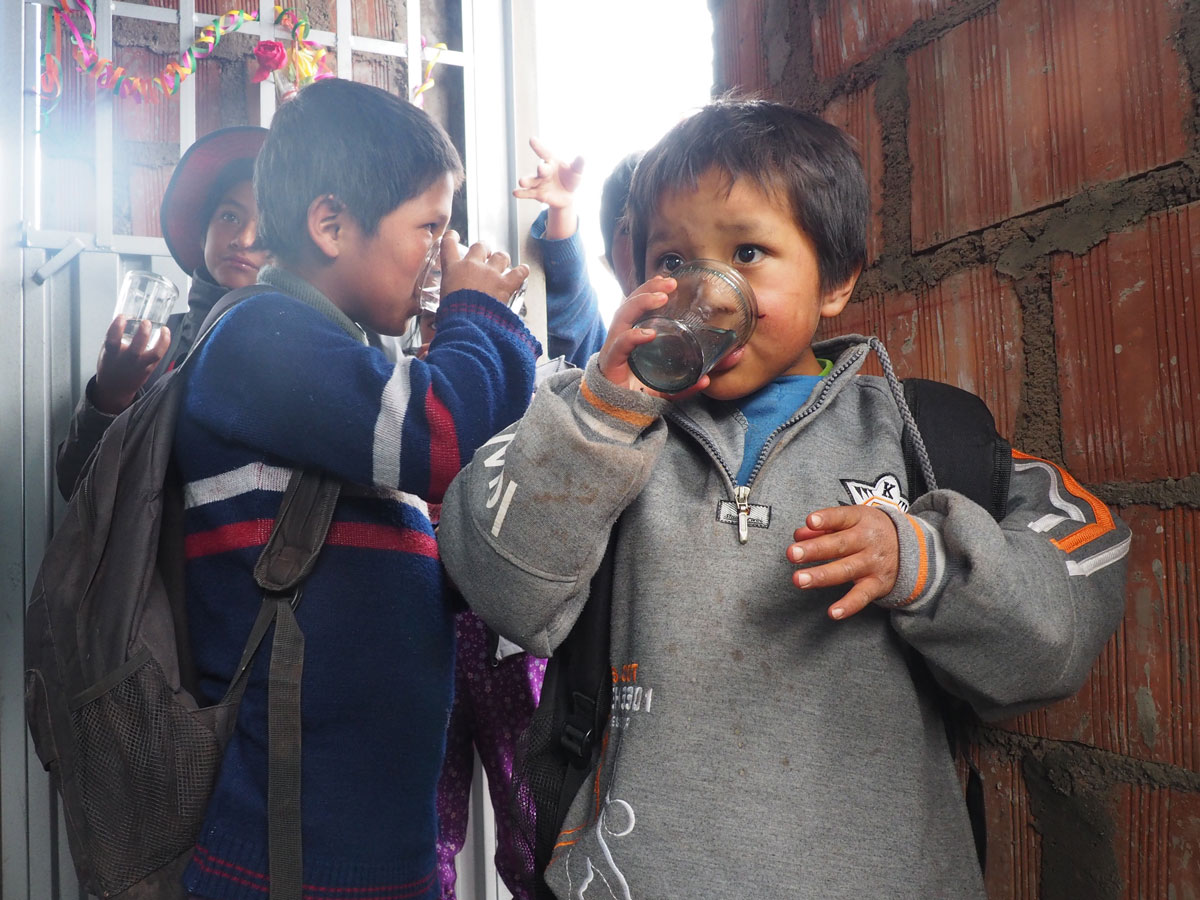
The kids from Huillcapata, Peru, try the new filtered water during the education event. Photo courtesy of Vid Micevic
In the Dominican Republic, there was a children’s event and an adults’ event with a series of posters and discussion points for everyone and games for the children. They were all excited about it and understood the importance of the message.
“It was one of our first times doing an event of that caliber and size and it turned out amazingly,” Sridhar says. “Tons of family members from the community came up to us and gave thanks for our work and for the clean water.”
Nearly 15,000 more people now have sustainable clean water
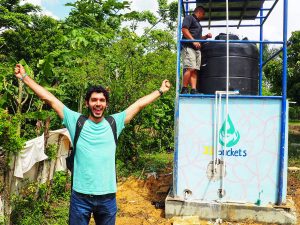
Mark Huerta celebrates in front of the finished water filtration system in the Dominican Republic. Photo courtesy of Vid Micevic
After a five-year process of creating the system in Bangladesh that helps 12,400 people, this June 33 Buckets successfully launched effective filtration systems with reserves of potable water, clean water businesses for distribution, and a community support system in Peru and the Dominican Republic — both in less than a year from their initial contact. However, it wasn’t an easy journey.
In Peru, it was a race against the clock to get the filters running effectively. The team thought they might not make their targeted launch date.
“Mark and Vid were working to get the filter right and doing chlorine tests to make sure the water was properly chlorinated,” Sridhar says. “It was right at the end of the educational seminar that all the tests showed us the water was ready.”
But Huerta says that’s just what engineers have to deal with.
“In engineering one of the first things you learn outside the classroom is there are always things that go wrong and things you have to adjust on the fly,” Huerta says.
In the end, it all worked out. Everyone from the community to the 33 Buckets team to the non-profits they worked with were happy with the outcome.
“It’s one thing to have the community leaders tell you ‘we need this’ and ‘the people appreciate it,’ but then it’s another to see the entire community, both the Dominican Republic and Peru, at the launch wanting to try the water and expressing their gratitude,” Huerta says. “That was the most fulfilling part and it gives me hope that the projects were both really successful.”
Huerta and the team were also fulfilled by making relationships, addressing a community’s difficulties, and helping people live healthier lives — and were humbled by the experience.
“We always have so much to learn and take away from being able to travel and meet and talk with people from such different backgrounds and experiences,” Strong says. “As much as we try to make an impact where we go, the communities make just as big of an impact on us.”
Preparing for the next steps
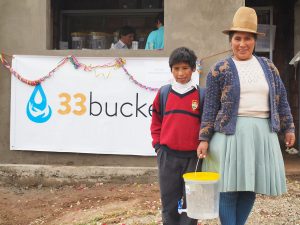
Huillcapata residents purchase the first container of filtered water from Agripino’s business. Photo courtesy of Vid Micevic
33 Buckets will be in frequent contact with the communities the first few months post-launch to help however they can, after which they’ll follow up monthly. In the Dominican Republic, Altagracia and Anderson will send back information on water sales and maintenance every week for the first three months and then check in monthly. In Peru, they’re adding data to a Google spreadsheet so 33 Buckets can see the water sales in real time.
And work isn’t done in Bangladesh. Their business is going very well, and they’ve expressed interest in being able to transfer the water further.
“We’re trying to help them finance [the expansion] through water sales in the local community close to where the filter is set up,” Sridhar says. “We don’t just give charity, we try to develop a sustainable solution by not financing things if it is possible to finance without us.”
33 Buckets also has received messages from organizations requesting its help with projects in Haiti, Tanzania and other places around the world, but the team wants to focus on scaling in Peru.
“Each country has its own unique circumstances, culture and connections in finding building materials and filter components, so there’s a learning curve to working in each country,” Huerta says. “We made great contacts with the municipality in Peru and identified two other at-risk sites around Cusco that want to work with us to make systems. We plan to make assessment trips within the year and implement the projects next year.”
Media Contact
Monique Clement, [email protected]
480-727-1958
Ira A. Fulton Schools of Engineering



